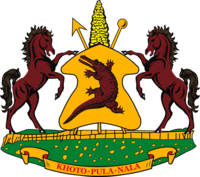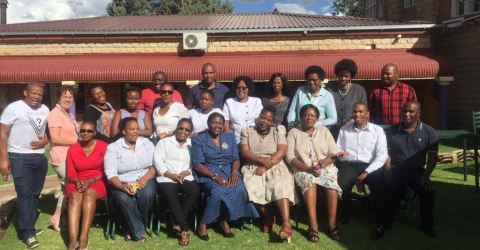
TB service delivery in the Kingdom of Lesotho is impacted by long delays between sample collection and receiving test results, especially in the rural areas and townships where TB laboratories are not operating optimally. In extreme cases, this process can take as long as 3 months and there is a backlog of over 900 TB samples. Consequently, this leads to delayed commencement of treatment for TB. The Ministry of Health (MOH) has earmarked the renovation of two (2) TB laboratories; National TB Reference Laboratory and Leribe TB Laboratory to address these problems and bottlenecks. In addition, upgrades are planned at three (3) Correctional Service Facilities with the goal of creating TB isolation wings to reduce exposure to TB infection and transmission among prison inmates.
The upgrades are aimed at improving the delivery of TB services and ensure they meet occupational health and safety, and infection control standards. The scope of the planned renovations of the laboratories is informed by the World Health Organization (WHO) comprehensive assessment, together with one conducted by the Africa Centre for Disease Control (CDC).
During a joint project support mission to the country conducted by the World Bank (WB), NEPAD Agency and East Central and Southern Africa Health Community (ECSA-HC), the Deputy Principle Secretary in the Ministry of Health in Lesotho, Ms. Palesa Mokete confirmed that an Engineer has since been employed under the Southern Africa Tuberculosis and Health Systems Support (SATBHSS) project to oversee and supervise these works from a technical perspective with support from other government units.
“We have a backlog of TB samples at the National TB Reference Laboratory and renovating this laboratory will help to reduce these numbers”, Ms. Mokete said.
World Bank Senior Health Specialist, Ronald Mutasa outlined the objectives of the mission which is aimed at reviewing SATBHSS project progress and work with the country team to identify priority areas for scaling up activities.
“We acknowledge the work being done in Lesotho and will shall continue to provide technical support to ensure the country finishes the project start-up year strongly”, Mr Mutasa said.
The current state of the TB laboratories pose many hazards especially to the service providers, as well as in the management of specimens according to internationally accepted standards. During a courtesy call, the Permanent Secretary at the Ministry of Labour and Employment (MOLE) Mrs Maseithati Mabeleng emphasized that her Ministry will take up responsibility for implementing the Occupational Safety and Health (OSH) component on the project to accelerate progress.
“The SATBHSS project comes at the right time and will answer most of the questions that have hindered TB screening, as well as access to social benefits for the ex-miners who once worked in South Africa and left without accessing their benefits”, Mrs Mabeleng said.
Through the SATBHSS project, the national Occupational Safety and Health (OSH) Profile in Lesotho will be updated and the TORs for this work have been drafted. The Permanent Secretary at the Ministry of Mining Mr. Soaile Mochaba acknowledge and appreciated the work being done under the SATBHSS project through a multi-sectoral approach involving the different Ministries. He reminded everyone that the biggest driver of TB and occupational lung diseases in Lesotho is mining so they are a stakeholder in addressing the scourge of TB.
“This project is creating synergies that will ensure our Ministries work collaboratively to implement multi-sectoral approaches to kick-out TB and occupational lung diseases in Lesotho”, the PS Ministry of Mining said.
The renovations shall involve removing and replacing the current roof covering with a proposed economical and maintenance free aluminium sisalation membrane to prevent rain water penetration and formation of water drops caused by water vapour. The current roof covering has been letting in water especially during the rainy season. In addition, the damaged doors to the secure areas will be replaced by new ones with a heated viewing window. The new doors to the Ante Rooms will be replaced by aluminium ones that interlock with electromagnetic latches to ensure that when one door is open the other cannot open.
Furthermore, the existing wooden pass boxes will be replaced with heavy duty metal pass boxes in GL powder coating. The cracked walls and broken water pipes will also be reinforced and replaced respectively to ensure they are sealed to safeguard specimens in the laboratory and prevent accidents. The Ministry of Health shall engage a contractor to undertake the above and many other renovation works. Additionally, since some of the works involve specialized knowledge there shall also be some nominated sub-contractors to undertake these works.
The upgraded laboratories will aim to attain certification level with internationally accepted standards for TB laboratories and meet standards for occupational health and safety. Revamping the facilities will help the laboratories to operate optimally and strengthen efforts to end TB by 2030 in Africa.






